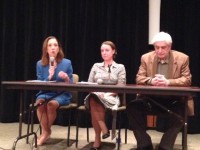Informative Talk Tries to Set the Record Straight on Local/Global Human Trafficking

A collection of women from across Westchester, one even traveled from the Bronx, met at the Scarsdale Public Library last week to learn about sex trafficking and what they might be able to do to help stop it. The event was sponsored by Assemblywoman Amy Paulin (D-Scarsdale) and featured Sarah Porter of ECPAT (Ending Child Slavery at the Source) and Stuart Perrin, author of a book on global trafficking titled “Little Sisters.”
Paulin called the talk “The Global and Local Atrocity of Sex Trafficking” because the staggering statistics place 27 million people worldwide, with 200,000 in the United States, living as sex or labor slaves, resulting in a $32 billion global slave market.
Paulin told the audience that she first became aware of human trafficking in 2005 when she was acting Executive Director of My Sisters Place in White Plains.
By 2006 she was involved in the first Human Trafficking bill in New York State. “It was the first in the United States and it passed in the State Legislature to set a precedent across the country,” Paulin explained. “By 2007 human trafficking for sex and labor became a felony crime.”
“Who are these young women involved in the sex trade?” Paulin asked. “Many of them are just children aged 11 to 13 years old, many who have run away from home and been kidnapped. In some cases the kidnappers, employed by the slave traders, are 19 and 20 year-old boys who approach these girls on the street and say they will help them. They act like a boyfriend and when it is too late, the girls are caught in a terrifying situation where they are repeatedly raped and beaten. They fear for their lives and those around them.”
Sarah Porter said she first became aware of trafficking when she volunteered overseas with the Peace Corps. Today she works domestically with social service agencies.
“We need more and better foster parents to help our young girls,” Porter said. “Much of the issue is in diagnostic training. The social service workers need to be more aware of the risk factors and what to do when they see the red flags. Because there is a situation where people see a prostitute rather than a victim, they don’t help when a girl comes in to the emergency room, for example, suffering from a beating. Kids are mixed into the adult sex trade. Hospitals have protocols for domestic violence, but they don’t necessarily for identifying victims of human trafficking.”
Acknowledging that education is key, ECPAT runs training programs for hotels and other businesses in the tourism industry, so employees know what to look for and to report instances when they suspect them. “Forty-five percent of exploited youth have been exploited in a hotel,” Porter said.
In 2008, Paulin penned the Safe Harbor Bill that identified girls involved in prostitution up to the age of 15 as victims and by 2012 a new bill was before the state legislature to make trafficking a Violent B Felony Crime and to identify girls up to 16 and 17 as victims.
“If the law is that 18 is the age of consent, then why when money is exchanged is there a difference?” Pauli again asked. ‘These girls are victims of rape. We need to make the crime harsher.”
Stymied by a hesitant assembly and a political process that becomes bogged down with debate that brings other elements such as pay equity discrimination and Roe v. Wade into the discussion, the current Safe Harbor bill is still not passed and faces a June 20th deadline.
While it would seem that human trafficking would not make its way to Westchester County, Paulin said she was surprised that 35 of the girls she had met at rehab programs were from local communities. “It doesn’t matter what income a family has, abuse finds its way into all income levels. Trafficking of children outside the U.S. into the country is a big problem, but the problem is also a local.”
The book “Little Sisters” by Stuart Perrin can be ordered from Bluekitepress.com. Visit ecpatusa.org for more information about human trafficking prevention and intervention programs in the United States.

